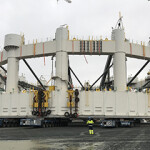New England lobstermen say they'll likely sue if NOAA expands fishing restrictions

The New England Fishermen’s Stewardship Association (NEFSA) has promised it will challenge NOAA in court if the administration finalizes an expansion to the Massachusetts Restricted Area (MRA) – a region of the ocean off the coast of the Northeast U.S. that prohibits lobster fishing.
NOAA is proposing modifications to the MRA that will add the temporary “wedge” closure area to the permanent closures, which last from 1 February to 30 April. The “wedge” is an area of approximately 200 square miles in between two of the existing closures that remain open to fishing.
The current closures already apply to 9,000 square miles of fishing area, and the Massachusetts Lobstermen’s Association said further expansion would cost coastal communities millions.
“The Massachusetts Lobstermen’s Association (MLA) continues to fight the closure of the wedge in Massachusetts due to the long-term implications such an arbitrary and capricious action can have on the commercial lobster industry,” the MLA said in a release. “We will continue to take the necessary legal action to stop this unwarranted and unjust action as the commercial lobstermen in Massachusetts continue to bear the brunt of these closures.”
Regulations have banned the use of lobstering equipment in a region off the coast of the U.S. state of Massachusetts since 2015 in a bid to protect the critically endangered North Atlantic right whale. One of the most endangered species on the planet, NOAA has cited entanglement with fishing gear as one of the main dangers threatening the extinction of the species.
The new additions to the restricted fishing areas off Massachusetts would make temporary rules more permanent. Aggregations of right whales prompted officials from Massachusetts and NOAA to order the removal of traps in the “MRA Wedge” earlier this year, an area of federal waters between the Massachusetts Restricted Area North and the Massachusetts Restricted Area that still allowed lobster fishing during the months of the ban. The order was the second time in two years that NOAA announced the emergency rule.
Now, NOAA wants to make that rule permanent, prompting NEFSA and the MLA to announce it will fight any additional rulemaking.
“NOAA is expanding the restricted area to protect the North Atlantic right whale, an endangered marine mammal. The agency baselessly blames lobstermen for right whale deaths, citing entanglements with fishing gear,” a release from NEFSA and the MLA said.
The two organizations said federal agencies’ treatment of fishermen is in stark contrast to their treatment of other potential threats to whales in the region. A spike in whale deaths along the East Coast in early 2023 led five U.S. senators to call for an investigation by NOAA, and the fishing industry has attributed the deaths to work on offshore wind installations in the region of the deaths.
While fishermen face restrictions and bans, the work on wind farms has been allowed to continue.
“I wish regulators treated fishermen as well as they treat foreign corporations,” NEFSA COO Dustin Delano, a fourth-generation lobstermen, said. “Lobstermen have built up one of the most sustainable fisheries in the world, but regulators treat us like an invasive species. Meanwhile, the corporations industrializing our coasts are getting tax credits and official permission to harm marine species.”
NEFSA said that if NOAA finalizes the rule expanding the MRA, it “expects to challenge it in court.”
Lobster fishing’s actual impacts on right whales have been the subject of lawsuits from conservation organizations that led to a judge ruling repeatedly that the fishery violates the Endangered Species Act. The ruling prompted NOAA to change its regulations, which in turn resulted in a lawsuit by the Maine Lobstermen’s Association challenging the necessity of the rules based on the lack of evidence linking lobster fishing to right whale deaths.
Image courtesy of NOAA






Share